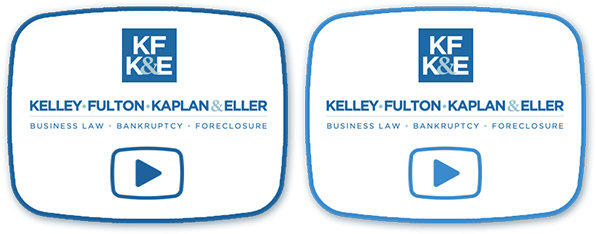West Palm Beach Chapter 13 Bankruptcy Attorney
If you owe substantial debts but believe you may be able to pay off your creditors in the next three to five years, filing for Chapter 13 bankruptcy may be your best option. Under a Chapter 13 bankruptcy, the debtor creates a repayment plan that involves making payments from future income to pay off debts. Certain situations exist in which a Chapter 13 bankruptcy is particularly useful, including situations in which you are behind on a loan. In short, filing for a Chapter 13 bankruptcy may allow you to stay in your home or keep your motor vehicle even if you are desperately behind on your payments.
The law firm of Kelley Kaplan & Eller has been assisting residents of South Florida for years with bankruptcy proceedings. Don’t hesitate to contact an experienced West Palm Beach Chapter 13 bankruptcy attorney at our firm to discuss your situation.
Chapter 13 Bankruptcy Basics
Chapter 13 is a repayment plan or individual reorganization bankruptcy. Only individual consumer debtors can file a Chapter 13 bankruptcy. There are debt limitations. In other words, a debtor filing a Chapter 13 bankruptcy cannot have any more than certain amounts of unsecured debt and secured debt, as defined in the bankruptcy laws.
A Chapter 13 is like a court-enforced repayment plan, which creditors must accept. Unlike credit management plans outside of bankruptcy, creditors don’t get to choose whether to be bound by the plan. It protects the debtor from collection action during the case and discharges any unpaid balance of dischargeable debts at the end of the plan. A Chapter 13 stops the running of interest and late charges on unsecured debt (like credit card debt) and stops late charges on secured debt (like cars and mortgages)
There are four reasons a debtor will repay his or her debts in a Chapter 13 repayment plan instead of discharging them in a Chapter 7
- The debtor makes too much money and doesn’t qualify for a Chapter 7;
- The debtor has assets that are non-exempt that he or she would lose in a Chapter 7;
- The debtor is behind on a secured debt (a house or car payment) that he or she wants to catch up on by spreading out the missed payments over time; and
- The debtor is able to strip a lien such as a second mortgage or car loan.
Chapter 13 permits the debtor time to pay debts that can’t be discharged in bankruptcy, like recent taxes or back child support, to cure defaults on home mortgages and to eliminate that part of a lien that is greater than the value of the asset at the beginning of the case.
A Chapter 13 is a powerful tool for the right debtor. If you fit into any of the above categories, it may be more advantageous for you to file a Chapter 13 than to file a Chapter 7, under the right circumstances.
Filing for a Chapter 13 Bankruptcy
While both types of bankruptcy proceedings may be beneficial for debtors, a Chapter 13 bankruptcy is much different from a Chapter 7 bankruptcy. The key difference is that a Chapter 13 bankruptcy permits the debtor to cover his or her existing debts with future income, and there’s no liquidation.
If assets aren’t completely liquidated as with a Chapter 7 bankruptcy, what happens when a consumer files for a Chapter 13 bankruptcy? Typically, the debtor will take a number of steps to repay a percentage of his or her debts owed over the course of a repayment period. These steps usually involve the following:
Repayment plan: the debtor will create a repayment plan, which typically falls between three and five years’ time. You will file the repayment plan when you file for bankruptcy, and it will specify how long it will take you to repay your debts and how much you will pay on your debts during the repayment period.
Sticking to the repayment plan: when debtors are able to abide by the terms of their repayment plans, any remaining dischargeable debt will be discharged.
Unlike with a Chapter 7 bankruptcy, you will need to be able to prove that you have a regular source of income with enough disposable income that you will be able to meet the terms of your repayment plan. The Florida means test will determine how much debt will be repaid at the end of the period.
Benefits of a Chapter 13 Bankruptcy
There are many advantages of a Chapter 13 bankruptcy. In general, Florida residents with assets that they want to keep, like a motor vehicle or a home, may want to consider a Chapter 13 bankruptcy. In addition, if you have property that’s non-exempt in Florida, a Chapter 13 bankruptcy also may allow you to keep your property when a Chapter 7 bankruptcy won’t.
This type of bankruptcy can also be a very useful tool for reorganizing debts, and it can help debtors who are behind on payments. For example, a Chapter 13 bankruptcy can do some of the following for you:
- Prevent a foreclosure on a house when you are behind on mortgage payments
- Prevent interest from accruing on certain debt
- Help you to catch up on missed mortgage payments
- Help you to catch up on missed automobile payments
- Help you to catch up on back taxes you owe
- Allow you to renegotiate some of the terms of your debts
- Allow you to retain certain property that is non-exempt
Contact a West Palm Beach Chapter 13 Bankruptcy Attorney
Filing for bankruptcy can feel daunting, but at Kelley Kaplan & Eller, we have years of experience helping Florida residents with Chapter 13 bankruptcies. Florida bankruptcy law can be confusing to navigate on your own, but our experienced West Palm Beach bankruptcy attorneys can help you today. Contact our office for a free Chapter 13 consultation to learn more.




